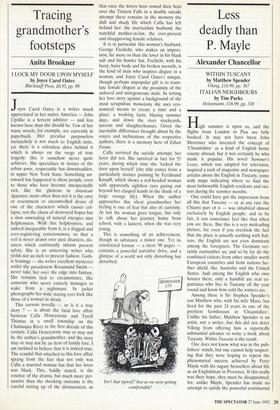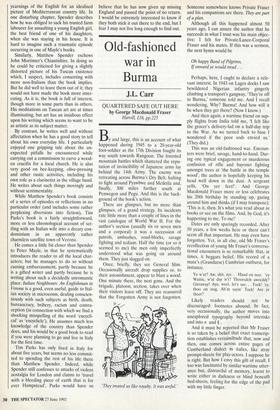Less deadly than P. Mayle
Alexander Chancellor
High summer is upon us, and the flights from London to Pisa are fully booked. It may not have been John Mortimer who invented the concept of `Chiantishire' as a kind of English home county abroad, but it was certainly he who made it popular. His novel Summer's Lease, which was adapted for television,' inspired a rush of magazine and newspaper articles about the English in Tuscany, some with maps indicating where to find the most fashionable English residents and visi- tors during the summer months.
One could have got the impression from all this that Tuscany — or at any rate the Chianti part of it — was inhabited almost exclusively by English people: and to be fair, it can sometimes feel like that when you are there. But this is a very misleading picture, for even if you overlook the fact that the place is actually seething with Ital- ians, the English are not even dominant among the foreigners. The Germans cer- tainly outnumber us, and so by far do the combined visitors from other smaller north European countries and from nations fur- ther afield, like Australia and the United States. And among the English who own houses there, only a handful are real ex- patriates who live in Tuscany all the year round and know how cold the winters arc.
Among these is Sir Stephen Spender's son Matthew who, with his wife Maro, has lived for the past 24 years in one of the prettiest farmhouses in `Chiantishire'. Unlike his father, Matthew Spender is an artist, not a writer, but this did not deter Viking from offering him a reportedly substantial advance to write a book about Tuscany. Within Tuscany is the result.
One does not know what was in the pub- lishers' minds, but one cannot help suspect- ing that they were hoping to repeat the phenomenal success achieved by Peter Mayle with his sugary bestsellers about life as an Englishman in Provence. If this really was their hope, they must be disappointed; for, unlike Mayle, Spender has made no attempt to satisfy the powerful sentimental yearnings of the English for an idealised picture of Mediterranean country life. In one disturbing chapter, Spender describes how he was obliged to sack his trusted farm labourer for assaulting a young English girl, the best friend of one of his daughters, when she was staying in his house. It is hard to imagine such a traumatic episode occurring in one of Mayle's books.
Similarly, Matthew Spender eschews John Mortimer's Chiantishire. In doing so he could be criticised for giving a slightly distorted picture of his Tuscan existence which, I suspect, includes consorting with more non-Italians than the book implies.
But he did well to leave them out of it; they would not have made the book more inter- esting. As it is, the book is full of interest, though more in some parts than in others. His meditations on Tuscan art are at times illuminating, but art has an insidious effect upon his writing which seems to want to be as artistic as its subject matter.
By contrast, he writes well and without affectation when he has a good story to tell about his own everyday life. I particularly enjoyed one gripping tale about the un- expected pitfalls he encountered while carrying out a commission to carve a wood- en crucifix for a local church. He is also very good on bee-keeping, olive-pressing and other rustic activities, including his own role as a clarinetist in the village band. He writes about such things movingly and without sentimentality.
While Matthew Spender's book consists of a series of episodes or reflections in no particular order (and includes some rather perplexing diversions into fiction), Tim Parks's book is a fairly straightforward, more or less chronological account of set- tling with an Italian wife into a dreary con- dominium in an apparently rather charmless satellite town of Verona.
He comes a little bit closer than Spender to Peter Mayle, in that he systematically introduces the reader to all the local char- acters; but he manages to do so without causing embarrassment, partly because he is a gifted writer and partly because he is writing about such a decidedly unromantic place. Italian Neighbours: An Englishman in Verona is a good, even useful, guide to Ital- ian society in microcosm, dealing conscien- tiously with such subjects as birth, death, bureaucracy, bribery, racism and contra- ception (in connection with which we find a shocking misspelling of the word 'encycli- cal' as 'encyclicle'). He assumes much less knowledge of the country than Spender does, and his would be a good book to read if you were planning to go and live in Italy for the first time.
Tim Parks has only lived in Italy for about five years, but seems no less commit- ted to spending the rest of his life there than Matthew Spender. Indeed, while Spender still confesses to attacks of violent nostalgia for London and claims to 'travel with a bleeding piece of earth that is for ever Hampstead', Parks would have us believe that he has now given up missing England and passed the point of no return. I would be extremely interested to know if they both stick it out there to the end, but I fear I may not live long enough to find out.



















































 Previous page
Previous page